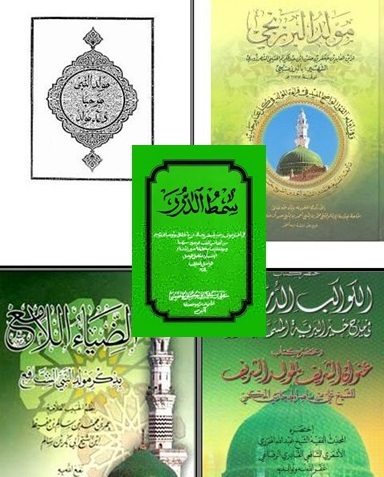Maulid Al-Barzanji Pengarang: Syaikh Ja'far bin Hasan al-Barzanji (1128-1177 AH) Format: PDF Kapasitas: 8,8 MB Read Online, DO. Sharing Options. Share on Facebook, opens a new window; Share on Twitter, opens a new window; Share on LinkedIn; Share by email, opens mail client. Maulid Al-Barzanji [Al-Imam Ja'far Ibn Hasan Al-Barzanji].pdf.
Jump to navigationJump to searchJaafar Al Barzanji
Mawlid al-Barzanjī (مولد البرزنجي) is the popular name of one of the most important and universally accepted panegyrics of the Islamic prophet Muhammad in the Arabic vernacular. The complete title of the work is, “‘Iqd al-Jawhar fī Mawlid al-Nabiy al-Azhar (عقد الجوهر فى مولد النبي الأزهر) – The Jewelled Necklace of the Resplendent Prophet’s Birth”. It is work of the poet and Islamic jurist of the city of MedinaJaʿfar b. Ḥasan al-Barzanjī.

The Mawlid genre[edit]
The work is highly revered and widely recited by Sunni Muslims around the world. In South East Asia and South Africa, the term “Barzanji” is synonymous[citation needed] with the word “Mawlid”, which is essentially a colourful celebration and spiritual display of deep love of the Prophet Muḥammad. This is done through poetic description of his blessed conception and birth, the miraculous exploits and significant events in his life, and description of his internal and external disposition. It is closed with a sublime supplication seeking the fulfilment of needs of the ephemeral world here and the pleasures of the everlasting abode in the Hereafter.
Public approval[edit]
The work has a central place during the annual commemoration of the advent of Muḥammad which, according to majority consensus, was on the 12th day of the Islamic month of Rabī al-Awwal. In the Muslim households of Asia and Africa, it is also recited to solicit Divine blessings on special occasions such us the birth of a child, moving into a new house, opening of a new business, and even at the time of death - for the hallmark of a believer is to rejoice in God’s blessing (i.e. the birth of Muḥammad) than to lament a loss (of a loved one). It also serves to remind the believer that no loss is greater than the loss of Muḥammad. Yet, he continues to live in the hearts and minds of the faithful.
Scholarly acceptance[edit]
The acceptance of the work amongst the scholarly elite is demonstrated by the numerous commentaries upon it composed by accomplished scholars including the author’s descendant, Ja’far ibn Ismā’īl al-Barzanjī (d. 1317 AH / 1899 CE), the Highest Juridical Authority (Muftī) of the Shafites in Medina. Another prominent commentator was Muhammad ‘Ulaysh (d. 1299 AH/1881 CE) , the Highest Juridical Authority (Muftī) of the Malikites in Egypt. A further popular commentary was by the Sundanese scholar, Muḥammad Nawawī al-Bantānī (d. 1316 AH/1898 CE) , a Shāfi’ī jurist and sūfi who settled in Mecca. The titles of some of the commentaries are as follows:
- al-Barzanji, al-Kawkab al-anwār ‘alā ‘iqd al-jawhar fī mawlid al-nabī al-azhar.
- ‘Ulaysh, al-Qawl al-munjī ‘alā mawlid al-Barzanjī
- al-Bantānī, Madārij al-ṣu‘ūd ilā iktisā’ al-burūd
Popular refrain[edit]
The work is the source of the popular refrain chanted in Mawlid gatherings around the globe:
عَطِّرِ ٱللّٰهُمَّ قَبْرَہُ ٱلْكَرِيمْ ، بِعَرْفٍ شَذِيٍّ مِنْ صَلاَةٍ وَتَسْلِيْم
ٱللّٰهُمَّ صَلِّ وَسَلِّمْ وَبَارِكْ عَلَيْهِ وَعَلَى آلِهِ
‘Aṭṭir Allāhumma qabrahu l-karīm / bi-‘arfin shadhiyyin min ṣalātin wa-taslīm
Allāhumma ṣalli wa-sallim wa-bārik alaihi wa-‘alā ālihi

O Allāh, perfume his noble grave / with the fragrant scent of blessings and peace
O Allāh, honour, bestow peace, and shower blessings upon him and his family
Contents of Mawlid al-Barzanjī[edit]
The contents of the Mawlid al-Barzanjī in English is as follows :
- The Prophet’s Lineage
- Before His Birth
- Preternatural Occurrences
- His Childhood
- ʿAbd al-Muṭṭalib and Abū Ṭālib
- Adulthood
- His Marriage
- Resolving a Dispute
- The Beginning of Prophethood
- The First Believers
- The Year of Sadness
- The Night Journey
- The Prophet Presenting Himself to the Tribes
- The Emigration
- The Cave
- Surāqa
- The Story of Umm Maʿbad
- Medina
- His Inward and Outward Perfection and Beauty
- The Seal of Prophethood
- His Love for the Poor
- Closing Supplication
References[edit]
- Katz, Marion Holmes (2007). The Birth of the Prophet Muḥammad: Devotional Piety in Sunni Islam. Routledge. ISBN0-203-96214-1.
Recent Posts
- Jet Audio 7.0.5.3040 Plus Vx (full Version) Skin
- Pdf To Excel Converter 3.3 Serial Key
- Serial Jepang Semi
- Free Download Lagu Yovie N Nuno Sampai Akhir Waktu Nanti
- Endosar Un Vale Vista Chile
- Criminal Minds Serial Killers In Opening Credits
- Intel Pentium R Dual Core Cpu E5200 Drivers Free Download
- Easy Weather Software For Mac
- Shakti Ke 48 Niyam Pdf
- Drivers Ed At Haftr
- Download Game Winning Eleven Untuk Laptop Windows 7
- Silabus Ipa Kelas 3 Sd Semester 2017
- El Feo Carlos Cuauhtemoc Sanchez Pdf Completo Software
- Modelsim Software Torrent
- New Edition Discography 320Kbps Torrent
- Winning Eleven 2012 Ps1 Bin English
- Free Download Software Rab Rumah
